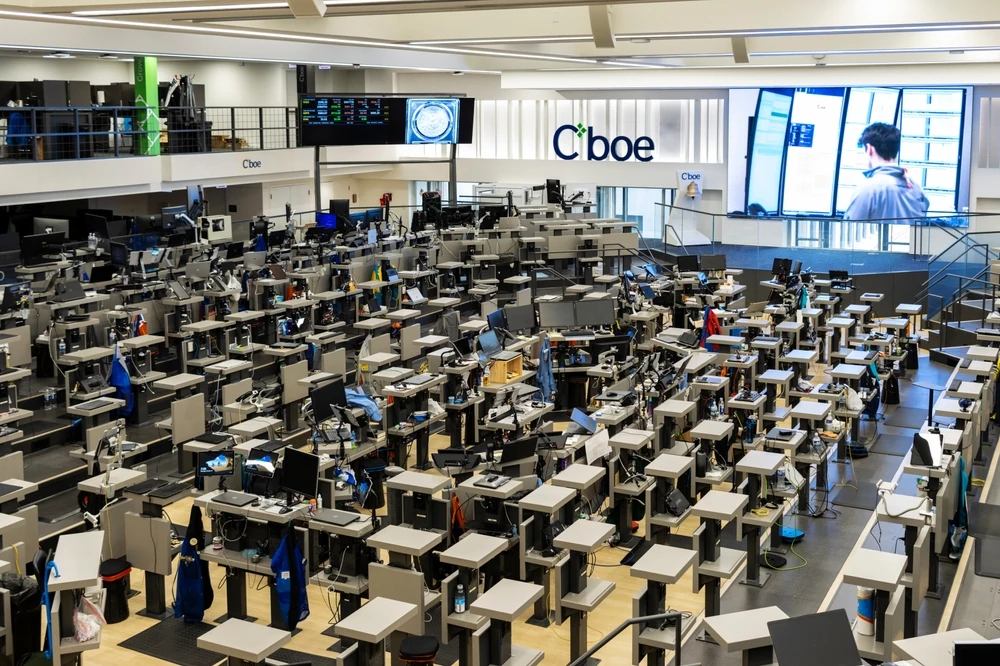There’s yet another company entering the prediction market space. News surfaced last week that Cboe Global Markets will launch its own prediction markets in the coming months, while notably avoiding controversial sports event contracts.
The move comes as its rival, CME Group, is gearing up to launch its prediction markets in collaboration with Flutter Entertainment via a standalone FanDuel mobile app called FanDuel Predicts.
During an interview with Bloomberg, Cboe CEO Craig Donohue acknowledged the prediction market space is moving quickly but that the industry is still in its early, nascent stages.
Focus on economic and financial event contracts
“Our focus right now is on our own organic efforts,” Donohue said. “I want to make sure that we develop our own products, that we list and clear them on our own exchange and through our own clearing houses and clearing house partners.”
Donohue said Cboe’s priorities will be different from many others in the marketplace, explaining that it will focus on economic and financial event contracts that are relevant to its core products and customer base.
“In some ways Cboe was actually the innovator of these kinds of markets,” Donohue said, pointing to shorter-term products like its zero-days-to-expiration (0DTE) options.
“I view that as an easy connectivity point,” he added. “As we focus on event and prediction products based on economic and financial risks, those customers will graduate into our options products.”
Cboe will avoid sports contracts
As for sports, Donohue acknowledged the potential to make money in the category but said the company will sidestep the category.
“I know there’s explosive growth there,” Donohue said. “It’s also fraught with lots of litigation and regulatory risks, so that’s, I think, for other people. For Cboe, we’re going to remain focused on things that have financial and economic implications.”
That’s a very different lane from CME’s most recent angle of attack, which will include sports event contracts accessible to FanDuel’s massive user base in certain jurisdictions, alongside contracts tied to global benchmarks and economic indicators. Cboe, by contrast, is making a concerted effort to avoid sports events altogether, underscoring how unsettled the legal status of sports event contracts remains — and why some think those disputes could eventually end up at the Supreme Court.
Read one way, Cboe’s no-sports stance isn’t a sign of caution about prediction markets so much as it is a vote of confidence in their staying power. The company is effectively betting that even if regulators or courts clamp down on sports event contracts, they still see potential in prediction markets tied to other events.
Major operators have taken notice
While Kalshi and Polymarket are leading the charge, the prediction market boom is no longer the curiosity of early-stage startups and crypto natives. The biggest U.S. exchange operators, as well as sportsbooks, are now circling the space — and in some cases, helping the current prediction-market hegemons as much as they threaten them.
Just last month, Intercontinental Exchange (ICE) — the parent of the New York Stock Exchange — announced that it would invest up to $2 billion in Polymarket at approximately a $9 billion valuation at the time. Soon after, Polymarket banners were raised on the outside of the NYSE.
Polymarket has since sought investments at a valuation between $12 billion and $15 billion.
Sports betting and daily fantasy sports behemoth DraftKings recently announced the acquisition of Railbird Exchange, helping expedite the pending launch of its own prediction prediction market product, DraftKings Predictions.
Taken together with Cboe’s planned platform and CME’s FanDuel Predicts app, these moves show competing models and strategies emerging. Major operators across industries clearly view event contracts as a natural extension of either their derivatives or sports empires.
Competition in political and economic markets
Outside of sports, the competition will continue to pick up with political markets as we inch closer to the 2026 midterms and, of course, the 2028 presidential election.
Polymarket facilitated roughly $3.6 billion in trades on the 2024 presidential election outcome. Meanwhile, Kalshi managed to eclipse $1 billion in trades despite launching its election contracts a month before Election Day.
As for more macro-focused contracts on the platforms, Kalshi did churn nearly $92 million on the Fed decision to cut interest rates in September, then Polymarket generated $252 million on the Fed’s October decision. With eight regularly scheduled Federal Open Market Committee (FOMC) meetings per year, those numbers add up and will continue to grow.
For Cboe, that’s the opportunity: even if sports contracts end up carved out, billions of dollars in political and economic risk are already trading — and one phase of the prediction market wars is undoubtedly over which kind of operator will own that business.

























